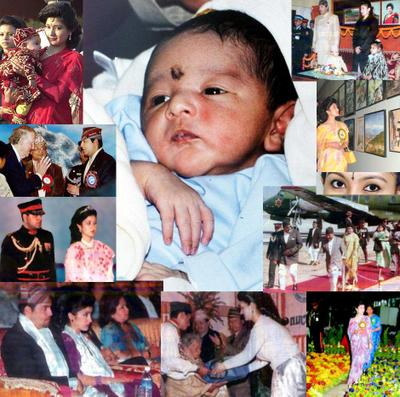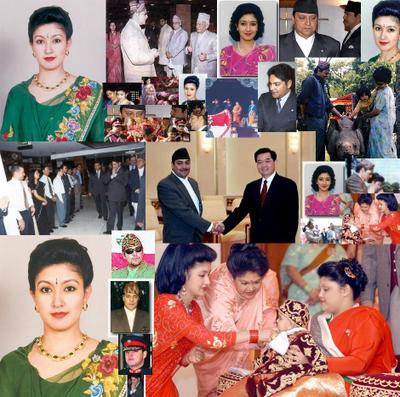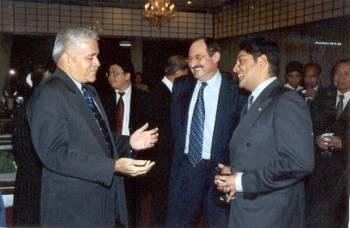 Look at these key figures:
Look at these key figures:- 63% chose constitutional monarchy while the remaining were split between the 22% who preferred executive monarchy and the 15% who wanted a republic
- ....... a thin minority of 5.5% respondents favoured a reinstatement of the dissolved HoR
- (51%) favoured framing a new constitution
- ..... suggested, by a clear majority, to go for a round table conference, interim government including the Maoists, and a constituent assembly

- ...... between July 1994 and October 2002. The House of Representatives was dissolved six times, special sessions of the parliament were summoned seven times, and the government changed 12 times
- 61% of the respondents feel that people do not enjoy equal rights
- 58% feel that everyone is not free to speak one's mind
- ...... that the people have the power to change the government they do not like is doubted by as many as 41%
- ..... courts scored highest at 30% respondents expressing very high trust in the institution, followed by the election commission (26%), local government (25.5%), army (25.5%), police (21%), civil servant (21%), central government (19.5%), parliament (17%), and political parties (14%)
- Nearly two-thirds of Nepali citizens stuck to democracy, with only 10% prepared to accept dictatorship in some situations
- 64% ‘strongly agreed' that the ‘country should be governed by the people chosen by fair elections', only one-fourth ‘strongly agreed' that the ‘country should be governed by the king.' The figure was even lower, only 11%, for army rule
- 63% chose constitutional monarchy while the remaining were split between the 22% who preferred executive monarchy and the 15% who wanted a republic
- (79%), affirmed the suitability of democracy in Nepal
- ...... opinion in favour of a ‘round table conference' is distinctly high, as 69% opted for it. Some 22.5% respondents suggested new election of the HoR. Only a thin minority of 5.5% respondents favoured a reinstatement of the dissolved HoR
- half the respondents (49%) favoured the formation of an interim government including the Maoists. 29% respondents were in favour of a new elected government. Those who stood for all-party government consisted 20.5%
- (51%) favoured framing a new constitution
- ..... suggested, by a clear majority, to go for a round table conference, interim government including the Maoists, and a constituent assembly
- What The People Feel by Krishna Hachhethu .....‘king in council of ministers' in 1951, a combination of ‘sovereign monarch and elected parliament' in 1959, and recently ‘king in parliament' in 1990 ..... ‘The days of monarchy being seen but not heard, watching the people's difficulties but not addressing them and being a silent spectator to their tearstained faces are over.' ...... initiating a system of executive monarchy in contravention of the 1990 Constitution...... parties and leaders concentrated more on power politics and self-aggrandizement, breaching democratic values and norms, which in turn contributed to an intensification of political instability, anarchy and chaos...... between July 1994 and October 2002. The House of Representatives was dissolved six times, special sessions of the parliament were summoned seven times, and the government changed 12 times..... intensification of power-centric intra-party conflicts, defiance of party whips, disintegration of parties, horse trading of members of parliament, manipulation of constitutional loopholes, political intervention by the palace and the court...... 61% of the respondents feel that people do not enjoy equal rights; 58% feel that everyone is not free to speak one's mind. Even the minimal achievement of democracy in ensuring that the people have the power to change the government they do not like is doubted by as many as 41%........ courts scored highest at 30% respondents expressing very high trust in the institution, followed by the election commission (26%), local government (25.5%), army (25.5%), police (21%), civil servant (21%), central government (19.5%), parliament (17%), and political parties (14%)....... Nearly two-thirds of Nepali citizens stuck to democracy, with only 10% prepared to accept dictatorship in some situations; 28% said democracy or dictatorship did not make a difference to them ...... level of support for democracy in Nepal is comparable to that in a long-standing democracy like India and is much higher than many countries of Latin America..... 64% ‘strongly agreed' that the ‘country should be governed by the people chosen by fair elections', only one-fourth ‘strongly agreed' that the ‘country should be governed by the king.' The figure was even lower, only 11%, for army rule......... (79%), affirmed the suitability of democracy in Nepal...... When asked to choose what they liked most about a democracy, 68% chose freedom to speak and act, something they have been denied by the imposition of emergency in the country...... the king's intervention of 4 October 2002 ..... 84% surveyed Nepali citizens observed that things got ‘bad' or ‘very bad' after this intervention ...... 63% chose constitutional monarchy while the remaining were split between the 22% who preferred executive monarchy and the 15% who wanted a republic...... a clear residue of yearning for king's rule among the less privileged sections of society: among women, rural dwellers and the less educated....... support for abolition of monarchy goes up with education and exposure and reaches 29% among the highly educated...... the support for executive monarchy declines sharply with age: 35% of t
 he elders support this idea while only 18% of the young and middle aged respondents are for an executive monarchy...... A majority of respondents, who come up with definite answers, suggested the need for a round table conference, an interim government including the Maoists, and a new constitution....... opinion in favour of a ‘round table conference' is distinctly high, as 69% opted for it. Some 22.5% respondents suggested new election of the HoR. Only a thin minority of 5.5% respondents favoured a reinstatement of the dissolved HoR....... 68% men and 71% women, and 70% villagers and 66% urban dwellers stamped on ‘a round table conference'....... a greater support to the round table conference than a fresh election of the HoR...... Choice to ‘round table conference' stepped up from 66% in hill to 72% in terai to 80% in mountain...... Support to the round table conference climbed up distinctly with the increase in education, from 60.5% (literate) to 70% (school level education) to 75% (higher level education)....... close to half the respondents (49%) favoured the formation of an interim government including the Maoists. 29% respondents were in favour of a new elected government. Those who stood for all-party government consisted 20.5%....... (51%) favoured framing a new constitution ...40% respondents suggested amendment of the constitution. Those who stood for retention of the present constitution without any amendment was very thin, a mere 9%....... Among the surveyed Nepali citizens who subscribed to a new constitution, the overwhelming majority (76%) supported the election of a constituent assembly....... accepted in terai by a substantial majority of 76%, followed by 74% in the hill region, and 50% in the mountain...... To overcome the nine-year long armed conflict, Nepali voters (among those who come up with a definite answer) suggested, by a clear majority, to go for a round table conference, interim government including the Maoists, and a constituent assembly ......... The king's claim to represent popular will and aspirations in the royal proclamation is not backed by any of the known and reliab
he elders support this idea while only 18% of the young and middle aged respondents are for an executive monarchy...... A majority of respondents, who come up with definite answers, suggested the need for a round table conference, an interim government including the Maoists, and a new constitution....... opinion in favour of a ‘round table conference' is distinctly high, as 69% opted for it. Some 22.5% respondents suggested new election of the HoR. Only a thin minority of 5.5% respondents favoured a reinstatement of the dissolved HoR....... 68% men and 71% women, and 70% villagers and 66% urban dwellers stamped on ‘a round table conference'....... a greater support to the round table conference than a fresh election of the HoR...... Choice to ‘round table conference' stepped up from 66% in hill to 72% in terai to 80% in mountain...... Support to the round table conference climbed up distinctly with the increase in education, from 60.5% (literate) to 70% (school level education) to 75% (higher level education)....... close to half the respondents (49%) favoured the formation of an interim government including the Maoists. 29% respondents were in favour of a new elected government. Those who stood for all-party government consisted 20.5%....... (51%) favoured framing a new constitution ...40% respondents suggested amendment of the constitution. Those who stood for retention of the present constitution without any amendment was very thin, a mere 9%....... Among the surveyed Nepali citizens who subscribed to a new constitution, the overwhelming majority (76%) supported the election of a constituent assembly....... accepted in terai by a substantial majority of 76%, followed by 74% in the hill region, and 50% in the mountain...... To overcome the nine-year long armed conflict, Nepali voters (among those who come up with a definite answer) suggested, by a clear majority, to go for a round table conference, interim government including the Maoists, and a constituent assembly ......... The king's claim to represent popular will and aspirations in the royal proclamation is not backed by any of the known and reliab le instruments of public opinion like free and fair elections or a referendum...... survey offers little evidence to support the king's presumption about popular will...... King Gyanendra's action of 1 February is not quite in line with, if not directly opposed to, the way the people of Nepal think....... the coming days will be hard for the king.
le instruments of public opinion like free and fair elections or a referendum...... survey offers little evidence to support the king's presumption about popular will...... King Gyanendra's action of 1 February is not quite in line with, if not directly opposed to, the way the people of Nepal think....... the coming days will be hard for the king.
To Meet Or Not To Meet
Opposition To The Idea Of Meeting With The King
Letter To Sharad Chandra Shaha
Mainstreaming The Monarchy
Royal Family Pictorial
If the people's wish were to be done, this is what would unfold:
(1) The obstinate Girija should forget about the 1999 House. The 1999 House is dead. The 1990 constitution is dead.
(2) The monarchy is not dead. Those who want a republic get cancelled out by those who want an executive monarchy. 63% want a constitutional monarchy.
(3) The seven parties should revise their 4-point agenda, and adopt a 3-point agenda: (a) roundtable conference that would lead to a Maoist disarmament that might involve inducting some of their armed cadres into the state army, (b) interim government, and (c) elections to a constituent assembly that guarantees a constitutional monarchy.



